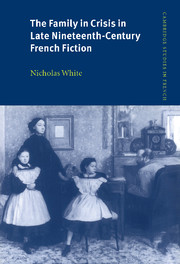Book contents
- Frontmatter
- Contents
- Acknowledgements
- Introduction: fin de siècle, fin de famille?
- Part One THE PROMISCUOUS NARRATIVE OF ‘POT-BOUILLE’
- Part Two PLEASURES AND FEARS OF PATERNITY: MAUPASSANT AND ZOLA
- Part Three THE BLINDNESS OF PASSIONS: HUYSMANS, HENNIQUE AND ZOLA
- Coda: Bourget's Un divorce and the ‘honnête femme’
- Notes
- Bibliography
- Index
- CAMBRIDGE STUDIES IN FRENCH
Introduction: fin de siècle, fin de famille?
Published online by Cambridge University Press: 22 September 2009
- Frontmatter
- Contents
- Acknowledgements
- Introduction: fin de siècle, fin de famille?
- Part One THE PROMISCUOUS NARRATIVE OF ‘POT-BOUILLE’
- Part Two PLEASURES AND FEARS OF PATERNITY: MAUPASSANT AND ZOLA
- Part Three THE BLINDNESS OF PASSIONS: HUYSMANS, HENNIQUE AND ZOLA
- Coda: Bourget's Un divorce and the ‘honnête femme’
- Notes
- Bibliography
- Index
- CAMBRIDGE STUDIES IN FRENCH
Summary
Vous croyez entendre un soupir, c'est une citation, – serrer une femme sur votre cœur, c'est un volume.
En ce moment, tous les littérateurs, et les plus dissemblables comme talent, affirment descendre de Flaubert … Ah! s'il était vivant, comme ils tairaient cette prétendue descendance!
8 May 1880 … Amidst the numerous faux débuts which might be said to have inaugurated the fin de siècle, perhaps none has the capacity to engage scholars of French literary and cultural studies alike more productively than the death of Gustave Flaubert. Indeed, few names resonate more profoundly in the echo chamber of nineteenth-century family life (and the fictional representation of its discontents). A point of rupture which was at the time far more conspicuous in its public splendour, and towards which present-day cultural analysts and readers of poetry might turn more immediately, is the burial of Victor Hugo on 1 June 1885, not least because this facilitated the self-liberation of Mallarmé's Crise de vers. In Roger Shattuck's words, ‘By this orgiastic ceremony France unburdened itself of a man, a literary movement, and a century’.
However, critics of the novel, not least those whose reading responds in varying ways to the paradigm of bourgeois fiction enunciated in Tony Tanner's classic account of Adultery in the Novel, will need little persuasion about the importance of Flaubert for the generation of Naturalist novelists who published in Paris in the final decades of the century.
- Type
- Chapter
- Information
- Publisher: Cambridge University PressPrint publication year: 1999



